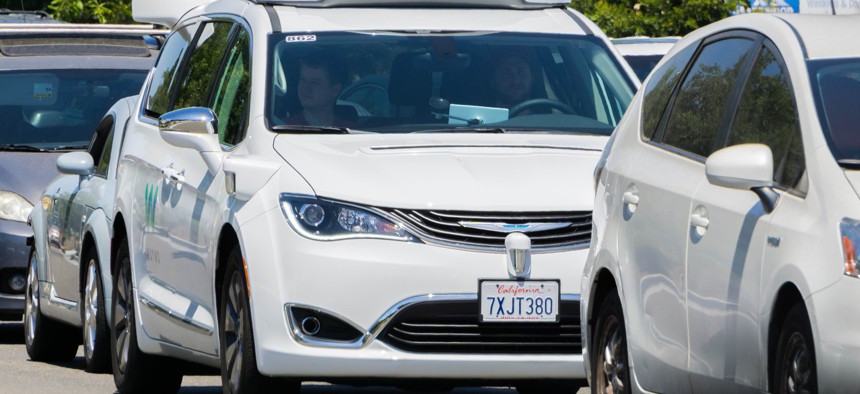Most Americans Uncomfortable With Self-Driving Cars, Survey Finds

A self-driving car on a street in California, during August 2017. shutterstock
Over half the respondents to a Northeastern University/Gallup survey also said they are unlikely to regularly use the technology.
Many Americans are reluctant to embrace self-driving vehicle technology, recent survey results suggest.
Fifty-four percent of respondents to the Northeastern University/Gallup survey said they are unlikely to use fully self-driving cars, and 59 percent say they would be uncomfortable riding in the vehicles on a daily basis. Additionally, 62 percent say they would not be comfortable sharing the road with self-driving trucks.
College graduates and younger survey respondents were more likely to say that they would use self-driving vehicles compared to people without bachelors degrees and older Americans.
"Self-driving cars are often seen as the next evolution in driving. However, Americans are deeply apprehensive. Overcoming this apprehension about the safety of the vehicles will likely encourage Americans to adopt self-driving cars and accept them on the road," a Gallup article published Wednesday about the survey results says.
It also notes that Americans have previously underestimated their willingness to adopt new technology, with nearly one-quarter of U.S. adults telling Gallup in 2000 that they would never get a cell phone.
Last September, the U.S. House passed legislation that would set national guidelines for deploying self-driving vehicles. A similar bill cleared the Senate Commerce Committee in October, but remains pending in the full chamber. It has been subject to holds by Democrats, who have cited concerns about safety and other issues.
The Northeastern University/Gallup findings were part of a broader survey about Americans' attitudes toward artificial intelligence. The survey of 3,297 U.S. adults was conducted by mail between Sept. 15 and Oct. 10. It has a margin of sampling error of +/- 2 percentage points at the 95 percent confidence level.
Bill Lucia is a Senior Reporter for Government Executive's Route Fifty and is based in Washington, D.C.
NEXT STORY: As a High-Tech Quake Alert System Takes Shape, There’s a Lower-Tech Way to Save Lives






